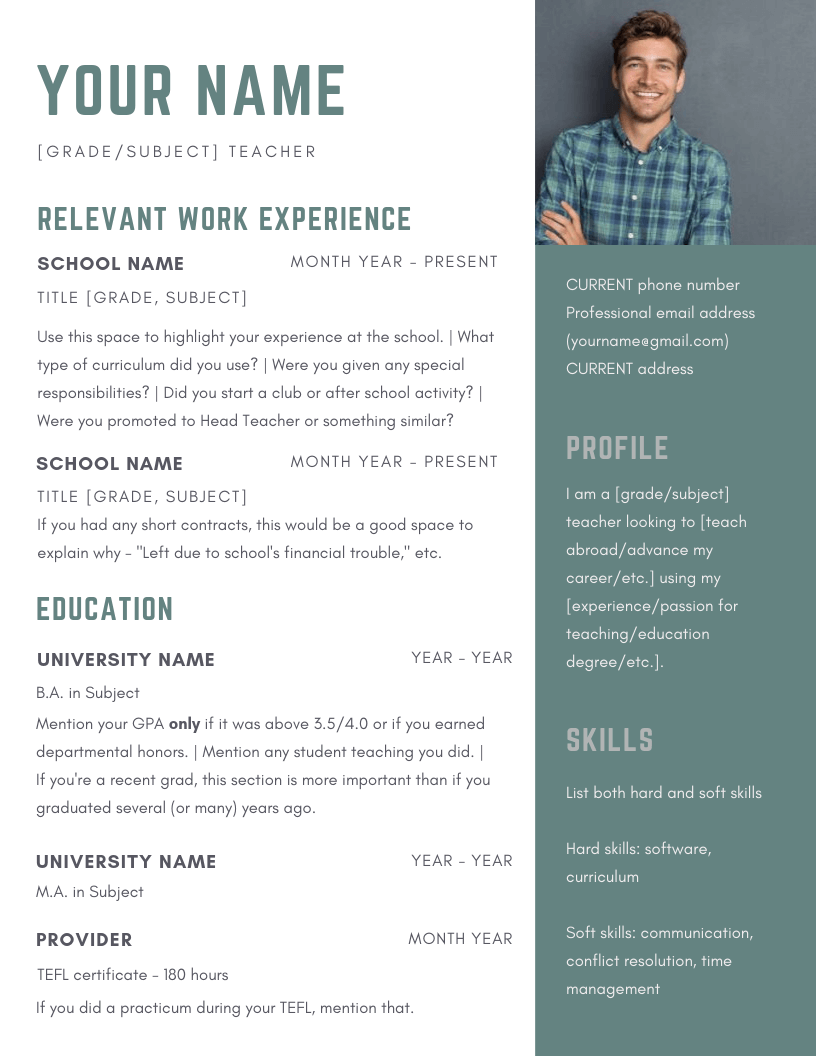So, you’ve finally decided to make the jump and teach abroad! Now it’s time to refresh or create your teaching English abroad resume.
There are many schools looking to hire foreigners, but how do you make yourself stand out from the crowd? The school’s first impression of you will be based off your resume.
Resume writing is an important skill that everyone needs to master; however, it can feel overwhelming if you’re not sure where to start. Understandably, many people feel lost and confused about how to write a resume and cater it to teaching English abroad. The following resume writing tips will help you to start getting those callbacks and land your dream job abroad!

Consider Your Audience
Depending on the school, they could be looking to hire anywhere from 10-1,000 foreign teachers per year! That means they are looking at a lot of resumes from all over the world every day. For some positions, you might be able to get away with sending the same resume to different schools. But if you see something you really like, or if you know the competition is fierce, you’re going to want to tailor your teaching English abroad resume to your audience.
By knowing your audience, you’re going to be able to cater your resume to the person reading it. One way to do this is by doing more research on the position or school. Feel free to use keywords when writing your resume as well. For example, if you have curriculum development experience and the position is looking for someone with this, make sure to highlight this as one of the first things the reader is going to see.
Or, if on the school’s website you notice they add an emphasis on extracurricular activities, it might be good to mention if you have experience with this as well. Absolutely take the time to edit and customize your resume – you’ll likely end up with several copies that you can then use for similar job postings!
Plus, you’re more likely to stand out from your competition by tailoring your resume to each school and position. This shows interest and dedication, which are two things that all employers are looking for in their employees.

Highlight Key Accomplishments
As a teacher, it’s common to take on extra responsibilities or roles in addition to your classroom teaching. While you were a 5th-grade science teacher, you could have also been responsible for leading workshops or coaching sports. These extra activities show great time management skills, and they demonstrate that you’re dependable and committed to your school.
These accomplishments are often overlooked on teaching resumes but can tell a school a lot more than you think. As a teacher, a lot of your resume is going to be accomplishment-based. If your students do well on exams or if you successfully integrate new technology into the classroom, schools are going to see you as more of an asset.
Even if you’re new to teaching, you can highlight accomplishments that you had while tutoring or taking a TEFL course. In-class TEFL courses often have times set aside where you do practicum teaching or intern at schools before being hired for your first teaching role. Including this on your resume would be very beneficial, because it shows potential employers that you’re proud of the steps that you’re taking to further your career.

Make It Relevant
When writing a teaching resume, you have 1-2 pages where you can highlight your most important and relevant qualifications and experience. Depending on the fonts and styles you choose, that doesn’t leave much space for you to represent yourself and show you’re the best candidate for the job.
Consider using a resume generator to neatly organize your resume. Since there’s limited space, the information on the resume needs to have a purpose. Think through the main points that you want to get across if someone is glancing at your resume – don’t waste any of your space with unnecessary or irrelevant information.
Ask yourself: “what would a school want to know about me?” or “what skills do I bring to the table that will help me in my teaching career?”
The answers to these questions should be included in your teaching resume. Other less specialized skills should not be included in your resume.
Here’s a simple resume format to follow:

Other Considerations for Your Teaching English Abroad Resume
Something to consider is if you should include your proficiency level with Microsoft Office as part of your skills. Most countries require foreign teachers to have a minimum of a bachelor’s degree, so it’s safe to assume that if you have a bachelor’s degree, you would be more than familiar with Microsoft Word. If you’re low on space, there’s no need to list these basic technological proficiencies.
Employers often wonder about gaps in resumes, so if you find that you have several long-term gaps in your work experience, it’s not a bad idea to include the reasons behind it. Depending on the situation, adding these in can help to ease any fears that hiring managers may have about you not being able to commit, and they can move along in considering you as a candidate.
It’s safe to say that no matter where your career takes you, you’re going to need a solid resume! When it comes to teaching English abroad, resumes are often that first step to being hired. Schools are looking for specific qualities, so it’s always good to consider your audience, highlight key accomplishments, and make your content relevant.
Hunting for your next job abroad will be so much easier once you have a great resume. If your resume is already up to par, then it’s time to start applying for overseas jobs!

